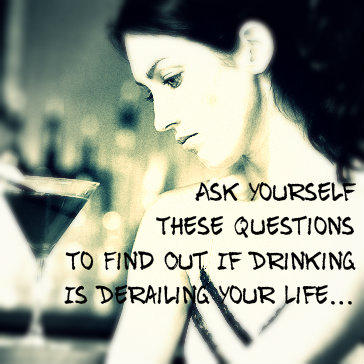Almost without exception, alcoholics are tortured by loneliness. Even before our drinking got bad and people cut us off, nearly all of us suffered the feeling that we didn’t quite belong. Either we were shy, and dared not draw near others. Or we were noisy good fellows constantly craving attention and companionship, but rarely getting it. There was always this mysterious barrier we could neither surmount nor understand.” (A.A. Twelve Steps and Twelve Traditions, 57)
The Isolation Of The Addict
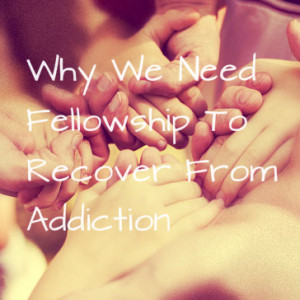 Isolation and addiction go hand in hand. Even if we were out every night and closing down the bars, surrounded by hordes of people, we felt somehow lonely. It wasn’t the presence of people we lacked, but relationship. In addiction we were confused about who we were and afraid to know our true selves. We used our addictions to hide from ourselves and to try to be the people we thought we wanted to be. Yet we suspected we didn’t belong and were quite certain that if people knew who we really were, they’d reject us. The loneliness was profound.
Isolation and addiction go hand in hand. Even if we were out every night and closing down the bars, surrounded by hordes of people, we felt somehow lonely. It wasn’t the presence of people we lacked, but relationship. In addiction we were confused about who we were and afraid to know our true selves. We used our addictions to hide from ourselves and to try to be the people we thought we wanted to be. Yet we suspected we didn’t belong and were quite certain that if people knew who we really were, they’d reject us. The loneliness was profound.
Fellowship: The Antidote To Isolation
The 12-Step Program is designed to begin bringing us out of isolation. That doesn’t mean simply throwing us in a room with a bunch of other drunks and junkies, it means helping us to know ourselves in ways we never had. As we work the Steps we learn to see ourselves honestly and we begin cultivating a real relationship with that self. We grow in humility and we lose our fear of rejection. Through the working of the Steps we are cleaning up the wreckage of the past and seeking to live well in the present by practicing the program principles in all of our affairs.
Meeting Fellowship Encourages Sobriety
Our isolation perpetuated our addiction. To recover, we do our part to begin breaking the secrecy that allowed our addiction to control our lives. The meeting is the place where we start this process. Knowing we are among those who have walked similar paths, we begin to feel comfortable opening up and being real. The meeting is a safe place where we won’t be judged or ostracized. There we find a system of support—people who are personally invested in our sobriety and wellbeing.
Cultivating Fellowship For Recovery
We can, of course, go through the motions without ever going deeper than surface level with our program fellows. But this only jeopardizes sobriety. We all need time to acclimate to the 12-Step life and we may not be ready to have complete strangers prying into our business, but we have to be moving in the direction of relationship. How?
By being intentional. The program recommends picking up the phone and talking with other members—ideally three a day. These don’t have to be profound conversations, but one day they will be. It’s an exercise in breaking down isolation and overcoming the fear of people. We don’t show up to the meeting late or duck out early. We force ourselves to interact. We take a sponsor and set up a schedule of regular interaction. We meet with other fellows in coffee shops to talk about the program. We serve. And we remember that coming out of isolation is one of the best secrets to lasting sobriety.
Life takes on new meaning in A.A. To watch people recover, to see them help others, to watch loneliness vanish, to see a fellowship grow up about you, to have a host of friends—this is an experience you must not miss.” (Alcoholics Anonymous, 89)
Read More About Starting Over And Embracing Life In Recovery
We all have those voices in our heads—the critic, the tempter, the downer, the voices telling us we’ve never been anything and we shouldn’t even try. But in order to want sobriety and progress in recovery, we need to learn to silence the voices of opposition. But how do you get past the voices in your head that keep you in dysfunctional and destructive patterns?
Identify The Negative Voices
 It helps to begin by identifying the messages flying around in your head. Whose voice is the one that you hear most strongly and loudly in your mind? Who is the one, though you are an adult, who is still criticizing you and tearing you down and insisting you conform to his or her way of life, dysfunctional as it may be? Listen to what you hear when you think you need to take a drink or get high. Who or what is controlling you without your permission?
It helps to begin by identifying the messages flying around in your head. Whose voice is the one that you hear most strongly and loudly in your mind? Who is the one, though you are an adult, who is still criticizing you and tearing you down and insisting you conform to his or her way of life, dysfunctional as it may be? Listen to what you hear when you think you need to take a drink or get high. Who or what is controlling you without your permission?
Parents’ voices ring in our ears though they may be long dead. Through their words and actions they imposed their view of the world, relationships and love when we were in our youngest and most impressionable and vulnerable stages of life. We took that input at face value. We didn’t question if it was right or wrong or sane. And today, as adults, many of us are still living our lives guided by those dysfunctional, damaging beliefs.
Or maybe it was a harsh coach or teacher or a relentless sibling or school bully. Without realizing it we are still hearing these critical and insulting voices in our heads. We are still subconsciously dominated by the people whose opinion we may not even respect and whose approval we no longer covet. We need to begin to set ourselves free of these mental tyrants.
How To Let Go And Live For Ourselves
How do we learn to let go of others’ perceptions of the world? How do we live for ourselves rather than for the whims of some undefined them? We do it by beginning to intentionally perceive our own world. How do we think about things? What do we think we are capable of, regardless of what others have told us? What do we want out of life? What are the things we believe are most worth living for and pursuing? As an adult, you have the freedom to make your own decisions, have your own opinions and live in a way that is pleasing and healthy for you. What does that look like?
One woman, in a loving relationship with a man, was afraid to express her needs or her emotions for fear of being a burden. Her partner, however, didn’t view her emotions as anything other than valid and worthy of consideration and discussion. Still she feared being the “difficult woman” because of how her father viewed women and their needs and the way he conceptualized their motives as self-serving. But this experience was her father’s, not a universal truth about women and men.
As she grew up and desired to have a healthy and functional romantic relationship, she realized that she would need to put her father’s perceptions and prejudices about the world and relationships out of her mind in order to experience the world and her life as her own. Her father’s experience was not hers; she was not a demanding woman or self-serving. She did, however have emotions and needs that her partner was healthy enough to want to honor. She learned that not all women were self-serving or demanding and that not all men viewed them that way.
Evaluate What’s Helpful And What’s Not
As we progress through life and we see our frequent hang-ups, and the beliefs that don’t serve us, we have to begin to ask whose voice it is that we are hearing. Who is motivating the feelings of fear and apprehension we feel? Is it a parent telling you that you’ll never have what it takes? Or that you have never been good enough? Is it a competitive sibling making fun of your interests and talents? Is it a judgmental “friend” who was only trying to give you some helpful advice?
It is time to begin to evaluate that which is not helpful and then to let it go so that you may live free—free to determine your own life, free to recover and free to recognize and realize your own potential. How many of us drank or practiced our addictions because we couldn’t stand ourselves and needed an escape from our own reality? Or because we didn’t believe ourselves worthy of much better than playing out our lives as drunks and just getting by? Identifying the negative voices supporting those damaging beliefs can help us to see that we have been living a lie and are indeed worthy of so much more.
How Therapy Can Help
These life-controlling beliefs are deeply ingrained and they are hard to overcome—in many cases therapy may even be helpful in figuring out where the roots lie. Between our 12-step work and therapy, we gain the tools to uproot those old beliefs and toss them onto the compost pile. Your mind is your own; don’t give it over to the voices that only seek to tear you down. Live the victorious life that was meant for you.
Read More About Hope In Recovery
29 Jan 2014
Is PCP Use Dangerously Increasing?
PCP is a well-known nickname for phencyclidine, a powerful tranquilizer that, among its other effects, interferes with the ability to remain consciously connected to the self or to one’s surroundings. Since the 1960s, the tranquilizer has been purposefully or unintentionally used as a recreational drug by a small but significant number of teenagers and adults. For a long time, PCP seemed to drop in popularity among drug users. However, according to the results of a report released in November 2013 by the federal Substance Abuse and Mental Health Services Administration (SAMHSA), use of the use of PCP may be on the rise.
PCP’s Effects
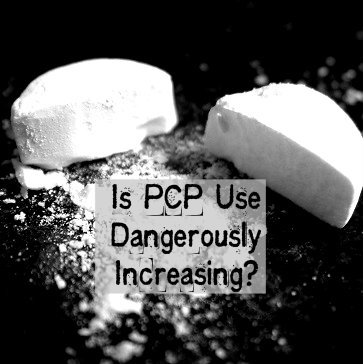 PCP produces its effects as a tranquilizer by causing dissociation, a detached mental state featuring a diminished capacity to take in the sensory information that human beings rely on to stay oriented to reality and maintain self-awareness. The drug can also produce a number of other immediate or short-term effects, including hallucinations, delusional behavior, paranoia, unusual aggression or agitation, euphoria, panic, a lack of normal mental or physical responsiveness, speaking difficulties, muscle impairment, changes in breathing and heart rates, obsessive thought patterns and depression.
PCP produces its effects as a tranquilizer by causing dissociation, a detached mental state featuring a diminished capacity to take in the sensory information that human beings rely on to stay oriented to reality and maintain self-awareness. The drug can also produce a number of other immediate or short-term effects, including hallucinations, delusional behavior, paranoia, unusual aggression or agitation, euphoria, panic, a lack of normal mental or physical responsiveness, speaking difficulties, muscle impairment, changes in breathing and heart rates, obsessive thought patterns and depression.
The specific short-term effects of PCP in any given individual depend largely on the amount of the drug he or she consumes. People who take doses well over 10 mg can experience a phencyclidine-related overdose that leads to seizures, coma or loss of life. Potential long-term effects of habitual PCP use include chronic memory problems, chronic psychosis and persistent depression or anxiety.
Tracking PCP Use
In the U.S., the federal government tracks the use of PCP and other commonly abused substances in a number of ways. For instance, the National Institute on Drug Abuse tracks usage rates among teenagers through an annual project called Monitoring the Future, which uses statistics gathered from 130 strategically chosen high schools to estimate larger national substance intake trends. The Substance Abuse and Mental Health Services Administration tracks drug use in the entire U.S. population by gathering information on drug-related incidents from emergency rooms at hospitals across the country, as well as information on drug-related deaths submitted by both coroners and medical examiners after they conduct autopsies. The system used to coordinate this information and issue important findings is called the Drug Abuse Warning Network (DAWN).
Evidence For A Rise In PCP Use – Who’s Using?
In the report issued by SAMHSA, officials from the Drug Awareness Warning Network tracked the national trajectory of PCP-related emergency room visits between 2005 and 2011. In 2005, 14,825 incidents were reported by emergency room personnel. By the close of 2011, this figure had risen to 75,538, or slightly more than five times the 2005 total. Much of this increase can be attributed to a serious spike in PCP-related episodes in the two years between 2009 and 2011.
The DAWN report contains a wealth of detailed information on exactly who is being impacted by the rise in PCP-related emergency room episodes. Among preteens and teenagers between the ages of 12 and 17, emergency room episodes increased by 184 percent between 2005 and 2011. Among older teenagers and young adults between the ages of 18 and 24, episodes increased by 289 percent.
However, the highest increases occurred among adults between the ages of 25 and 34; people in this age group experienced a 518 percent spike in PCP-related emergency room visits between 2005 and 2011. Adults between the ages of 35 and 44 experienced a 300 percent increase. No accurate figures were available for adults over the age of 44. In addition, the authors of the DAWN report concluded that, depending on the age group in question, boys and men are anywhere from three to 10 times more likely than girls and women to experience a PCP-related emergency room episode.
PCP Risk Knowledge
No one knows for sure if the DAWN figures, which only highlight one potential outcome of PCP use, point toward an actual rise in intake of the drug across the U.S. However, DAWN findings typically have significant value in the overall effort to track drug use trends. The authors of the report believe that any spike in PCP use may stem from lack of familiarity with the drug among younger users, as well as a subsequent lack of understanding about the risks associated with PCP intake. They also believe that future PCP-related public health campaigns may have an improved effect if they’re especially targeted at young adults in their late 20s and early 30s.
Read More About How As The Drug War Escalates, Drugs Get Stronger And Cheaper
28 Jan 2014
Will I Always Be In Recovery?
Recovery is an important word for addicts. The word implies a process. When you are in recovery, you are working toward a goal. That goal is to never use again, to remain sober, to avoid relapsing. A process also implies that there is an end point, that at some time you will be fully recovered. Is that really possible or is recovery a lifelong state of being?
Is Addiction Really A Disease?
 Thanks to years of research, we are finally beginning to better understand drugs, how they affect the user, how they change the brain, and what addiction really is. It turns out that addiction is a disease of the brain, and a chronic one. Like any other chronic disease (asthma, diabetes, heart disease, arthritis), addiction will keep returning if left untreated.
Thanks to years of research, we are finally beginning to better understand drugs, how they affect the user, how they change the brain, and what addiction really is. It turns out that addiction is a disease of the brain, and a chronic one. Like any other chronic disease (asthma, diabetes, heart disease, arthritis), addiction will keep returning if left untreated.
Some people still cling to the idea of addiction as a matter of willpower only, but the truth is that drugs change your brain. This means that giving up drugs becomes a difficult process requiring professional treatment. While people being treated for diseases like arthritis and high blood pressure are in recovery, so too are addicts going through the treatment process. If someone with high blood pressure stops taking his pills, his symptoms will return. If a drug addict stops seeking treatment, odds are he will start using again.
Is It Possible To Be Recovered From Addiction?
Research shows that drugs change your brain, both chemically and physically. The more you use and the longer the duration of use, the more changes will occur. Research also shows that these changes can improve with abstinence from drugs, but that they may never fully reverse. Addiction forever changes you, which means that being completely recovered may never be possible.
It may sound hopeless, but take strength in knowing that the longer you stay sober, the easier it becomes to resist the urge to relapse. Although your brain may not completely recover from drug use, it comes very close. Studies show, for instance, that when a meth user abstains for just 14 months, her brain returns to a near normal state. From that point on, avoiding relapse becomes monumentally easier.
How You Can Help Yourself And Others In Ongoing Recovery
It may seem like being recovered is a goal for which all addicts should strive. If you are recovered, all your problems are over, right? For the addict, the word recovered is a dangerous one. If you believe you are recovered, you might believe that you are not vulnerable to relapse. A recovering addict always carries that possibility. Even an addict who has been sober for decades could relapse and hit rock bottom again.
Being forever in recovery may seem daunting, but it protects you from becoming too relaxed about your addiction. It also gives you a reason to be continually improving yourself and your life. Always striving toward being a better and healthier person is a great way to live. Most people become stagnant in their lives. You, however, have the opportunity to be always bettering yourself.
Use your recovery as a tool and a process for becoming a better person. As you resist the urge to relapse, improve your life in other ways as well. Use activities like volunteer work, your career or spending time with loved ones as ways to be a good person, and to be successful in recovery. Turn to exercise, healthy eating or spirituality to make your life better and to stay clean. You may never fully recover, but you will always be in the process of living your life to its greatest potential.
Read More About Starting Your Life Over In Recovery
27 Jan 2014
How to Avoid Substituting Your Addiction
A substitute addiction is a substance, activity or behavior that replaces a previous addiction. Acquiring a substitute addiction is not uncommon for those in recovery from drug or alcohol dependence. Being an addict takes up the biggest portion of your life.
When you are addicted to drugs or alcohol, you obsess over getting more, you earn money just so you can buy more, you try to hide your habit, and you fight with loved ones about it. In other words, addiction takes over your life. When it is gone, it may feel like you have a void in your life that needs filling. It is possible to fill that hole with positive activities and healthy relationships, but if you’re not careful, you may just slip into another addiction.
Are Substitute Addictions Always Bad?
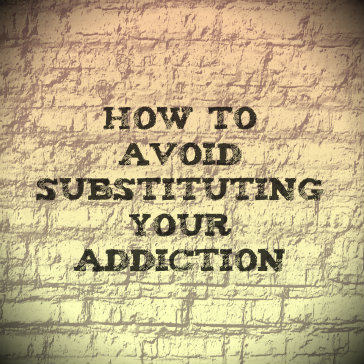 For some addicts in recovery, a substitute addiction may start out as a healthy new activity. Maybe you have taken up an exercise regimen, or you have started going to church again. Perhaps you are ready to devote yourself to your job and to getting a promotion. None of these are bad ideas, but they can become unhealthy obsessions and even approach the level of a behavioral addiction if you do not monitor your behaviors.
For some addicts in recovery, a substitute addiction may start out as a healthy new activity. Maybe you have taken up an exercise regimen, or you have started going to church again. Perhaps you are ready to devote yourself to your job and to getting a promotion. None of these are bad ideas, but they can become unhealthy obsessions and even approach the level of a behavioral addiction if you do not monitor your behaviors.
Not all addicts will develop these substitute addictions, but it is possible. There are underlying reasons you became an addict in the first place. These reasons may cause you to take up a new obsession when the first one has gone away. It is important that you find new ways to expend your energy after getting sober, but be aware of the possibility of a substitute addiction and remember that moderation is key.
How Can You Recognize A Substitute Addiction?
Because many of these substitute addictions start out as a healthy and positive new activity, it can be tough to tell when you are approaching a level of unhealthy obsession. If you became clean from prescription drugs, and then turn to drinking alcohol, the presence of a substitute addiction is obvious. Becoming obsessed with exercise or work is less so.
Listen to your loved ones and your support network. If people who care about you are telling you that you are becoming obsessed with your new hobby, you should listen. It is often easier to recognize a substitute addiction in someone else than it is to see it in yourself.
Be aware of your feelings and your motivations. If you went through a good rehab program, you learned to be aware of why you became an addict and how addiction changed your emotions and moods. If you notice similar feelings and motivations in your new hobbies or activities, it’s time to rethink what you’re doing.
How To Strike A Balance In Sobriety
Just because substitute addictions are a possibility in your new, sober life does not mean that you should not get involved in new activities. To avoid obsessing or developing a replacement for your addiction, learn to be more balanced. Instead of getting heavily involved in one activity, try several. Spread yourself out and try a lot of new things. You can always whittle your new activities down to two or three, but don’t allow all of your time to be taken up by just one.
Make sure your new activities don’t get in the way of the responsibilities you have. Make sure you keep time set aside for your relationships, your chores, and anything else you need to do. Let your loved ones help you through this process. With their support you can learn to be balanced and healthy while staying free of any kind of addiction.
Being an alcoholic means having a serious disease. Alcoholism refers to a physical dependence on alcohol. If you are an alcoholic, you experience alcohol withdrawal symptoms until you get a drink in you, you experience intense cravings for alcohol and you have developed a tolerance so that you need to drink more and more to feel the effects.
If you can’t say that all of these apply to you, yet you’ve wondered if you drink too much, you may not be an alcoholic, but you might still have a problem with drinking.
You don’t have to be a full-blown alcoholic for drinking to do its damage. Ask yourself these questions to find out if you should consider cutting back on alcohol.
Do You Drink To Feel Better?
Emotional drinking is a major warning sign. Occasionally unwinding at the end of the day with a cocktail and a group of friends is nothing to worry about, but if you need a drink to de-stress, you could have a problem. Maybe you look forward to happy hour every day because it makes you feel better and helps you relax. You should not be depending on alcohol to get you to that state of mind.
Is Your Drinking Causing Relationship Problems?
Drinking can be a major cause of stress in a relationship. Your drinking may be causing you to have more fights, it may be causing you to neglect your relationship by spending too much time out drinking, or it could be making you pass out at night and getting in the way of intimacy. Your spouse or partner might be trying to hint to you that you drink too much, or he may be telling you outright. If you get defensive immediately and refuse to change your habits, you are putting strain on your relationship.
Are You Neglecting Responsibilities Because Of Drinking?
Drinking too much may lead to some rough mornings. If this means that you are not able to get up and get your kids ready for school, or get to work on time, your drinking is interfering with responsibilities. Do you drink too much and find you can’t drive to take your kids to activities or find that you just can’t get your chores done? This is a problem and drinking is impacting your life.
Do You Drink Alone?
Drinking alone is rarely a good habit to have. If you have a drink alone every once in a while, you probably don’t need to worry, but if it is a regular occurrence, you need to rethink your drinking. You should be especially concerned if you drink alone and end up getting drunk or passing out.
Do You Feel Like You Should Curb Your Drinking But Can’t?
Maybe you have already given serious thought to your drinking. Maybe you decided that you should cut back a little so that you don’t feel so bad in the mornings or so that you have more time for your kids or spouse. Did you try to cut back and find you couldn’t do it? This is a serious sign of alcohol abuse. If you can no longer control when and how much you drink, you are headed down a dangerous path.
What To Do If You Answered “Yes” To Any Of These Drinking-Problem Questions
Any one of the signs is cause for concern. If you can answer yes to any of them, drinking is taking a toll on your life and it is time to rethink drinking. Start by talking with your partner or a close friend you trust. Having support can help you to change your habits. If that fails, consider getting professional help to make some important changes.
Read More To Find Out If Your Mom Or Wife Is Drinking Too Much
23 Jan 2014
What Is Kratom And What Are Its Health Risks?
Kratom is the common name for an herbal drug obtained from a tree species called Mitragnya speciosa. This drug has a history of use in Southeast Asia and current evidence indicates that its use is currently on the rise in the U.S., where consumers can make legal purchases over the Internet. Kratom apparently has the potential to
Read More
Addiction is a tricky illness, especially when it comes to behavioral addictions. Chemical addictions are straightforward. A substance—alcohol or drugs—makes chemical changes to your brain and makes it difficult for you to stop using. Clear signs of dependence emerge, such as withdrawal symptoms and tolerance. But, where do you draw the line when it feels like you might be obsessively engaging in an activity? Are you addicted? And if so, how do you stop?
What Is Social Media Addiction?
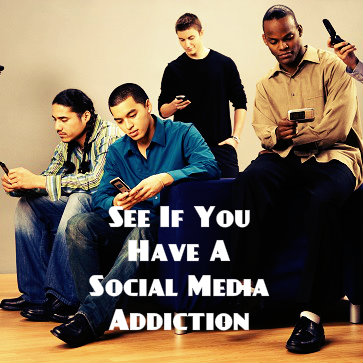 Being addicted to social media is not a condition recognized officially by the medical and addiction communities. However, there is a whole class of recognized addictive disorders called behavioral or process addictions. These refer to the compulsive and obsessive need to engage in a particular activity or behavior. It could be gambling, having sex, shopping, eating or even using social media.
Being addicted to social media is not a condition recognized officially by the medical and addiction communities. However, there is a whole class of recognized addictive disorders called behavioral or process addictions. These refer to the compulsive and obsessive need to engage in a particular activity or behavior. It could be gambling, having sex, shopping, eating or even using social media.
In our hyper-connected world in which we are all glued to devices, becoming obsessive about using them is not unusual. Social media sites like Facebook, Twitter, and Instagram allow us to keep in touch with other people, but when you keep turning to them with a burning compulsion, you may be developing a problem.
How Can I Tell If I Have A Problem With Social Media?
The line between responsible, normal use of social media and addictive use can be tricky to distinguish. It is especially difficult to see that line in your own use; it is easier to see it in others. For this reason, one sure sign that you need to rethink your usage is if someone points out your obsession. If a concerned loved one tells you that you may be turning to Facebook too often, you should listen and resist the urge to become defensive.
Another clear sign of a behavioral addiction is if you engage in the activity to feel better. If you get an emotional high or a feeling of stress relief from using social media, you are becoming dependent on it. Another sign is the experience of withdrawal. Withdrawal symptoms in chemical addictions are clear-cut and to be expected, but you can also experience them with behavioral addictions. Take notice if you feel anxious, depressed, or antsy when you can’t get to your phone or tablet to update your status.
If you find that your compulsive attachment to social media interferes with other aspects of your life, you need to reevaluate your usage. Maybe you are getting in trouble at work because you can’t stay off your favorite sites and you don’t get your work done. Maybe your relationships within your family are deteriorating because you spend too much time online. These are signs that you have a problem. Finally, if you recognize that you are online too often, try to cut back and find that you can’t, you may be addicted.
How Can I Get Help For Social Media Addiction?
As with any addiction, professional help and support of loved ones are the keys to recovery. As more people face the problem of overusing technology, more professionals are available to help you cope and come clean. Find a therapist or counselor who has experience working with people who have behavioral addictions. Also consider finding a support group that can help you deal with your problem by relating to others in the same situation. Enlist the support of your loved ones to help you get through this, and you will be successful.
Read More About Why Internet Addicts Are More Likely To Abuse Drugs And Alcohol


